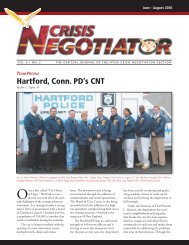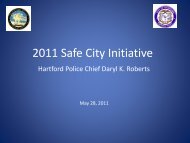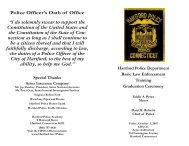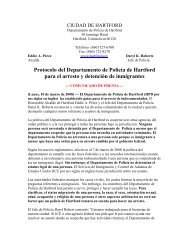Community Court Newsletter - Hartford Police Department
Community Court Newsletter - Hartford Police Department
Community Court Newsletter - Hartford Police Department
You also want an ePaper? Increase the reach of your titles
YUMPU automatically turns print PDFs into web optimized ePapers that Google loves.
SEATTLE CONTINUED...<br />
Seattle CC is a newer program (started in 2005, compared to <strong>Hartford</strong>’s inception in 1998) and it is a municipal<br />
court (as opposed to a state-level court) that is in session three afternoons a week. Seattle’s numbers have<br />
grown almost five-fold since they started almost five years ago: they saw 228 defendants in their first year of<br />
operation, and over 1000 defendants in 2009. 4 Still, by comparison to <strong>Hartford</strong>, their volume is significantly<br />
lower – and this is (at least in part) by design. The defendants that end up at Seattle CC are pre-screened by the<br />
City Attorney to determine eligibility, and the target group of defendants fits a challenging profile: repeat<br />
offenders, many of whom are chronically homeless and unemployed, suffer from multiple addictions, and often<br />
have co-occurring mental illness. 5 A needs assessment is performed by probation at arraignment, and then<br />
<strong>Community</strong> <strong>Court</strong> is offered as an alternative sentencing recommendation where defendants “opt-in” to the<br />
program, signing a contract agreeing to make contact with all recommended service providers and to fulfill the<br />
required number of community service hours.<br />
From my perspective, the most striking differences between Seattle and <strong>Hartford</strong> CC’s are related to timeframes<br />
and expectations for treatment. Seattle requires defendants to appear at orientation the day after arraignment,<br />
and they encourage completion of community service within two weeks (in <strong>Hartford</strong>, c.s. dates can be several<br />
months out, usually due to bulging dockets). Jurisdiction for Seattle cases is either 30 or 60 days – an<br />
intentionally short period of time to increase compliance. In addition, Seattle <strong>Community</strong> <strong>Court</strong> does not require<br />
successful completion of service programs in order to close a case; they only require that the defendant make<br />
initial contacts. When I asked staff about this, they explained that Seattle’s approach is based on client<br />
readiness rather than court mandates or monitoring: the leverage of the court is used to require defendants to<br />
initiate contact with treatment and services, and any continued participation is up to them. To prevent a<br />
revolving door for lapsing re-arrested clients, defendants are only allowed to participate in the <strong>Community</strong> <strong>Court</strong><br />
option a maximum of three times. 6 By contrast, <strong>Hartford</strong> CC tends to monitor the compliance and progress of<br />
chronic offenders over longer periods of time, and there is no limit to the<br />
number of times an individual may appear in the community court.<br />
A Common Thread<br />
While visiting Seattle <strong>Community</strong> <strong>Court</strong>, presiding Judge Bonner kindly<br />
invited me to sit in on several case conferences and a planning meeting.<br />
What I learned is that ultimately, community courts (okay, at least the<br />
two I have seen) seek to adapt to the changing needs of individuals and<br />
communities in constant flux. Although Seattle’s program has been in<br />
existence for half as many years as <strong>Hartford</strong>’s, the discussions could have<br />
been happening in either city, because the core issues are the same. How<br />
do we hold individuals accountable, offer services to those in need,<br />
prevent recidivism, maintain public safety, and improve quality of life in<br />
our cities and neighborhoods? You can look to the community courts to<br />
keep asking these core questions – and, while they share a common<br />
philosophy, their answers will be as varied and changing as the<br />
communities they serve.<br />
(Footnotes)<br />
1. http://www.courtinnovation.org/<br />
Regional Network of Mentor <strong>Community</strong> <strong>Court</strong>s (accessed January 2010)<br />
2. Fienblatt, J. and Berman, G.<br />
<strong>Community</strong> <strong>Court</strong> Principles. Center for <strong>Court</strong> Innovation. (1997, rev. 2000, p. 1)<br />
3. http://www.jud.ct.gov/external/super/spsess.htm#<strong>Community</strong><strong>Court</strong><br />
What is <strong>Community</strong> <strong>Court</strong>? (accessed December 2009) 4 ibid<br />
4. http://seattle.gov/communitycourt/facts.htm<br />
<strong>Community</strong> <strong>Court</strong> Fact Sheet. (accessed January 2009)<br />
5. Lapitan,T. Seattle Municipal <strong>Community</strong> <strong>Court</strong> Overview. (September 2009)<br />
6.http://seattle.gov/communitycourt/defendants/eligibility.htm<br />
Eligibility. (accessed January 2010)<br />
The Seattle Team iin a planning meeting.
















